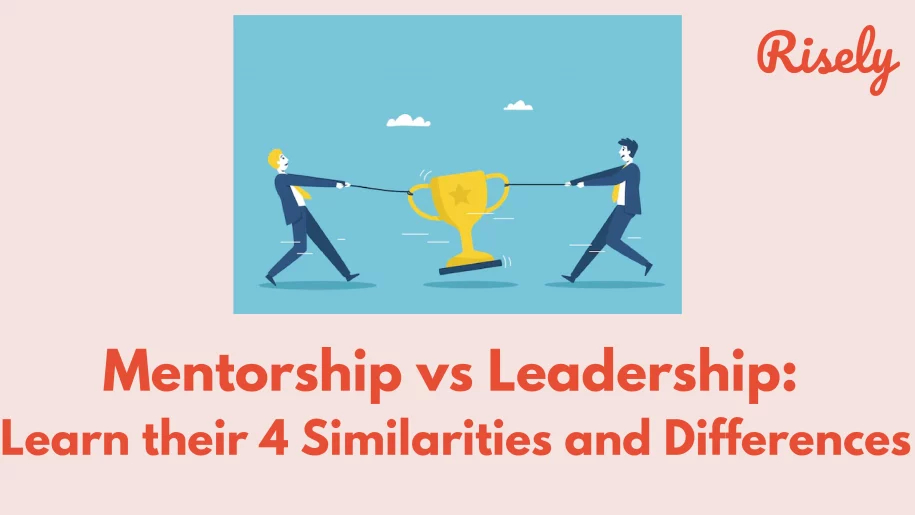Mentorship vs Leadership: Learn their 4 Similarities and Differences
Leadership and mentorship are two terms often used interchangeably but are entirely different concepts. While both play a significant role in shaping and developing individuals, each has its distinct approach. In this blog post, we will discuss what mentorship and leadership mean, how they differ, and their similarities. We will also explore the benefits of mentorship programs for leaders and share some tips on building mentoring and leadership skills. So whether you’re an aspiring leader or a seasoned professional looking to improve your skills, read on to learn more about mentorship versus leadership.What is Mentorship and Leadership?
Mentorship is a developmental partnership where a more experienced person (the mentor) guides and supports a less experienced person (the mentee) in achieving their personal and professional goals. The mentor provides guidance, advice, and feedback based on their experience, expertise, and knowledge. The relationship is typically focused on the mentee’s growth and development. Conversely, leadership is the ability to inspire, influence, and guide others toward a common goal or vision. It involves setting a direction, communicating effectively, making decisions, and motivating others to achieve their best performance. A good leader is someone who can lead by example, inspire trust and respect, and adapt their style to the needs and preferences of their team. Leadership can be formal or informal and demonstrated at any level of an organization or in any aspect of life. Do you often wonder how these two work together? Learn more about leaders who turn into mentors too: 5 Benefits Of Becoming A Mentor In The Workplace For ManagersMentorship vs Leadership
While mentorship and leadership share many similarities, they are distinct in their focus, relationship dynamics, timeframe, and power dynamics. Understanding the differences between mentorship and leadership can help individuals identify which role they are in and how they can effectively support their mentees or followers. This section will explore these differences in more detail and provide examples to illustrate each point.Focus
Mentorship is focused on the development and growth of the mentee, while leadership is focused on achieving a specific goal or vision. In a mentorship relationship, the mentor provides guidance and support to help the mentee improve their skills, knowledge, and confidence. This can involve giving feedback, sharing experiences, and offering advice. The focus is on the mentee’s personal and professional development, and the mentor supports them in achieving their goals. In contrast, leadership is focused on achieving a specific goal or vision, such as completing a project or growing a business. A leader is responsible for setting the direction, communicating the vision, and motivating their team to achieve the desired outcome. While a leader may also provide guidance and support to their team, the primary focus is on achieving the goal rather than on the personal development of individual team members.Relationship
Mentorship is a personal and informal relationship between the mentor and mentee. At the same time, leadership can be formal or informal and involves a more structured relationship between leaders and followers. In a mentorship relationship, the mentor and mentee may have a one-on-one relationship based on trust, respect, and mutual understanding. The mentor may be a friend or colleague, and the relationship is often more informal and personal. In contrast, leadership can involve a more formal relationship between the leader and their team or followers. The leader may have a specific role or position of authority, and the relationship is often more structured and focused on achieving a particular goal or objective.Other Interesting Reads
Timeframe
Mentorship is typically a long-term relationship that lasts months or even years, while leadership can be short-term or long-term, depending on the specific goal or project. For example, in a mentorship relationship, the mentor and mentee may work together over several months or even years as the mentee develops their skills and knowledge. In contrast, leadership can involve short-term or long-term goals, depending on the specific project or initiative. For example, a leader may be responsible for guiding their team to complete a project within a particular timeframe, or they may be accountable for achieving a long-term business objective over several years.Power dynamic
Mentorship typically involves an equal power dynamic between the mentor and mentee, while leadership often consists of a power dynamic where the leader has more authority than their followers. In a mentorship relationship, the mentor and mentee may have an equal relationship, where the mentor provides guidance and support but also learns from the mentee. The mentee can also give feedback and challenge the mentor’s ideas. In contrast, leadership often involves a power dynamic where the leader has more authority than their followers. The leader makes decisions and guides the team toward the desired outcome. While a leader may also listen to feedback from their team, the final decision often rests with the leader, and they can set priorities and make changes as needed.
Similarities between Mentorship and Leadership
While mentorship and leadership have distinct differences, they also share important similarities. Both involve guiding and supporting others toward achieving their goals and potential, and both require strong communication skills, empathy, and a willingness to learn and adapt. This section will explore the similarities between mentorship and leadership and highlight how these qualities are essential for both roles.Guiding and supporting others
Both mentorship and leadership involve providing guidance and support to others. In mentorship, the mentor guides and supports the mentee in achieving their personal and professional goals. In leadership, the leader guides and supports their team in achieving the organization’s goals. For example, a mentor might help a mentee navigate a difficult work situation. At the same time, a leader might provide coaching and feedback to team members to help them improve their performance.Strong communication skills
Both mentorship and leadership require strong communication skills. In mentorship, the mentor must communicate effectively with the mentee to provide guidance and feedback. In leadership, leaders must communicate effectively with their team to provide direction and motivate them toward a common goal. For example, a mentor might use active listening and open-ended questions to help the mentee identify their goals and create a plan to achieve them. In contrast, a leader might use clear and concise communication to set expectations and goals for their team.Setting a positive example
Both mentorship and leadership involve setting a positive example for others to follow. In mentorship, the mentor sets an example by sharing their experiences and demonstrating good practices. In leadership, the leader sets an example by modeling the behavior they want to see in their team. For example, a mentor might share a story about overcoming a difficult challenge to inspire the mentee, while a leader might demonstrate a strong work ethic to motivate their team.Focus on personal and professional development
Both mentorship and leadership focus on personal and professional development. They both work on promoting a culture of growth and development in their own ways. In mentorship, the mentor helps the mentee develop their skills, knowledge, and abilities to achieve their goals. In leadership, the leader helps their team develop their skills, knowledge, and abilities to accomplish the organization’s goals. For example, a mentor might provide the mentee opportunities to learn new skills or connect with other professionals in their field. In contrast, a leader might provide training and development opportunities to their team members to help them grow in their roles.How to build mentoring and leadership skills?
Building mentoring and leadership skills involves a combination of learning and practice. Here are some ways to develop these skills:- Seek mentorship and leadership opportunities: Look for opportunities to take on leadership roles or serve as a mentor. This could include volunteering in your community, joining a professional organization, or taking on a leadership role.
- Read and learn from experts: Many books, articles, and resources are available on mentorship and leadership. Take time to read and learn from experts in the field to gain new insights and ideas.
- Attend workshops and training sessions: Look for workshops focusing on developing mentoring and leadership skills. These can be a great way to learn new strategies and techniques and connect with other professionals interested in developing these skills.
- Seek feedback: Ask for employee feedback from others on your mentoring and leadership skills. This could include asking your mentee or team members for input on how you can improve or seeking feedback from a mentor or coach.
- Practice and reflect: Practice your mentoring and leadership skills regularly and reflect on your experiences. Reflect on what worked well and what could be improved, and use this feedback to refine your skills over time.
- Find the right match: The secret of effective mentor-mentee relationships lies in right mentor matching – bringing together people who are compatible and learn to work together. On the other hand, a bad match can be detrimental to the growth of both the mentor and the mentee.
Conclusion
In conclusion, mentorship and leadership are two concepts that share similarities. While leadership is about directing people toward a common goal, mentorship is more about guiding individuals toward personal and professional goals. It’s important to understand these two concepts’ differences as they require different skill sets and approaches. However, it’s also essential to recognize that mentorship and leadership can benefit each other. To develop your skills in both areas, start by building solid relationships with your mentees or team members, focus on skill development, and provide opportunities for career progression.Sharpen your effective delegation skills to become a better mentor and leader at work.
Start the effective delegation self-assessment now to understand loopholes that make delegation weak for you.
Frequently Asked Questions
What is the difference between mentorship and leadership?
Mentorship involves guiding and advising someone less experienced, while leadership involves inspiring and directing a group toward a common goal. While mentors may exhibit leadership qualities, mentorship is focused on individual growth, while administration is focused on achieving organizational goals and managing a team.
Is mentoring considered leadership?
Mentoring is not necessarily considered leadership, but it can involve leadership qualities. While leadership focuses on achieving organizational goals and managing a team, mentoring focuses on individual growth and development. Mentors may exhibit leadership qualities, but not all mentors are necessarily in a position of formal authority.
What is the difference between a leader coach and a mentor?
A leader coach and a mentor differ in their focus and approach. A leader coach is focused on helping an individual achieve specific goals or improve performance in a particular area. In contrast, a mentor is focused on providing guidance and support for overall personal and professional growth.
Should a leader be a mentor?
While a leader doesn’t need to be a mentor, it can be a valuable approach for developing employees and fostering a positive work environment. Mentoring can help employees feel supported and valued, improving performance and retention rates.
Other Related Blogs
6 People Who Should Not Be Your Mentor At Work
6 People Who Should Not Be Your Mentor At Work What’s common between Alexander the Great and Steve Jobs? They are famous leaders, we’d agree. But while one sailed in…
17 Amazing Questions To Ask A Leadership Mentor
17 Amazing Questions To Ask A Leadership Mentor Mentorship plays a crucial role in career development, and having a leadership mentor can significantly enhance your professional growth. A leadership mentor…
Getting the Best Results with Leadership Mentors: A Complete Guide
Getting the Best Results with Leadership Mentors: A Complete Guide As a manager, you know that leadership and managerial skills are essential for success. But developing these skills can be…
How To Manage Interns? 7 Tips For Great Results
How To Manage Interns? 7 Tips For Great Results With the concept of internships being in full swing, managers need to know how interns can benefit their teams. By understanding…


